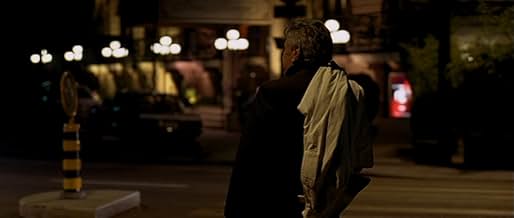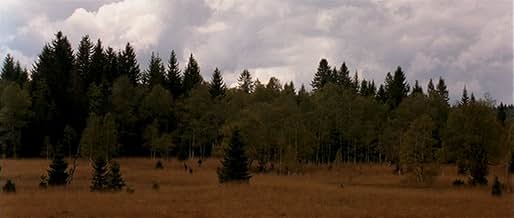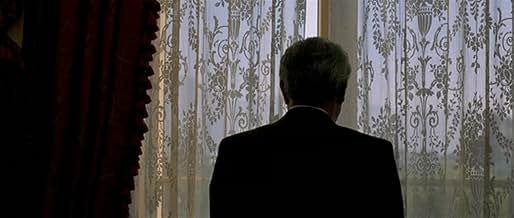IMDb रेटिंग
6.6/10
2.3 हज़ार
आपकी रेटिंग
अपनी भाषा में प्लॉट जोड़ेंAn emotionally cold man leaves the safety of his Alpine home to seek a heart transplant and an estranged son.An emotionally cold man leaves the safety of his Alpine home to seek a heart transplant and an estranged son.An emotionally cold man leaves the safety of his Alpine home to seek a heart transplant and an estranged son.
- निर्देशक
- लेखक
- स्टार
- पुरस्कार
- 4 कुल नामांकन
Yekaterina Golubeva
- La jeune femme russe
- (as Katia Golubeva)
Florence Loiret Caille
- Antoinette
- (as Florence Loiret-Caille)
फ़ीचर्ड समीक्षाएं
Claire Denis has demonstrated repeatedly that film does not need to tell a story, that it is sufficient to create an experience that allows the viewer to take the ingredients and make of them what they will.
Ostensibly the idea within the framework of a most non-linear film is the older man living on the French-Swiss border, a man devoted to his dogs, who still has a lover, but whose cardiac status increasingly threatens his life. He has a son with a little family who infrequently meet with him, but when he discovers he is in need of a heart transplant he opts for going to Tahiti via Japan to obtain a heart transplant on the black market and to rekindle a long lost relationship with a son he had form a Tahitian women years ago.
What Denis does with this outline of a story is use her camera to explore the loneliness of the soul, the vastness of nature, man's interaction with people vs animals, etc. Much of the time the 'film' doesn't make sense, but that is because we try too hard to connect all the dots laid out before us in beautiful pictures. Life is sort of like that: we look, see, observe, integrate, process, and make of it what we will.
In using this form of film making (much as she did in the strangely beautiful 'Beau Travail') Claire Denis has developed a signature technique. Whether or not the viewer finds the finished product rewarding has much to do with our individual methods of processing visual and conceptual information. This is an interesting and visually captivating film, but many viewers will find it an overly long discourse about very little. Perhaps watching again will change that. Grady Harp
Ostensibly the idea within the framework of a most non-linear film is the older man living on the French-Swiss border, a man devoted to his dogs, who still has a lover, but whose cardiac status increasingly threatens his life. He has a son with a little family who infrequently meet with him, but when he discovers he is in need of a heart transplant he opts for going to Tahiti via Japan to obtain a heart transplant on the black market and to rekindle a long lost relationship with a son he had form a Tahitian women years ago.
What Denis does with this outline of a story is use her camera to explore the loneliness of the soul, the vastness of nature, man's interaction with people vs animals, etc. Much of the time the 'film' doesn't make sense, but that is because we try too hard to connect all the dots laid out before us in beautiful pictures. Life is sort of like that: we look, see, observe, integrate, process, and make of it what we will.
In using this form of film making (much as she did in the strangely beautiful 'Beau Travail') Claire Denis has developed a signature technique. Whether or not the viewer finds the finished product rewarding has much to do with our individual methods of processing visual and conceptual information. This is an interesting and visually captivating film, but many viewers will find it an overly long discourse about very little. Perhaps watching again will change that. Grady Harp
It's certainly beautiful, as must be any movie featuring the outstanding cinematographer Agnès Godard and the criminally underacknowledged sound mixer Jean-Louis Ughetto. Most movies don't give us images as warm as Michel Subor drinking with a Pusan local or as vivid as a flashback to a boat's arrival at a French Polynesian island. But from the director of "Friday Night" and "Beau Travail," that's not enough.
Subor's character, Louis, is an intruder; various people are intruders in Louis's life (notably Béatrice Dalle); Louis even has an intruder inside his body - his transplanted heart. The heightening of Louis's condition, at first achieved through long looks at his huge chest scar, becomes absurdly literal when we see a bloody organ lying in the snow. All this is meant to make some vague point about rejection, and how communities and their outsiders relate to each other, but except in the Korean section and parts of the Tahitian one, Denis's use of photogenic isolated locations defeats her theme by not giving Louis enough human life to interact with. Perhaps I'm grading too harshly, but I expect great things from a Denis movie, and I didn't see them here.
Subor's character, Louis, is an intruder; various people are intruders in Louis's life (notably Béatrice Dalle); Louis even has an intruder inside his body - his transplanted heart. The heightening of Louis's condition, at first achieved through long looks at his huge chest scar, becomes absurdly literal when we see a bloody organ lying in the snow. All this is meant to make some vague point about rejection, and how communities and their outsiders relate to each other, but except in the Korean section and parts of the Tahitian one, Denis's use of photogenic isolated locations defeats her theme by not giving Louis enough human life to interact with. Perhaps I'm grading too harshly, but I expect great things from a Denis movie, and I didn't see them here.
Two things haunt you throughout L'intrus (The Intruder): who's the intruder and is it a movie or a dream you're watching? The ending is so shocking that for a while you're at a loss for an answer to either of those questions. The intruder pops up as different characters, different men in different circumstances who don't belong in the scene, so they're expelled from it, kindly or brutally, but often without emotional involvement. The main character, Louis, is a contemptible man. He's got rough ways, some mean job and no heart. He needs one and goes after it. He has a heart transplanted and afterwards decides to start a new life. Can this man succeed in his quest for redemption? A guy like that could cut your throat at the drop of a hat. You know it but Claire Denis doesn't encourage you to judge him. Occasionally, there's a young Russian woman -a beautiful girl who seems to inhabit someplace between heaven and earth - who does judge him. She may even punish him. But not Denis. There's the character played by Beatrice Dalle who wants no business with him: don't touch me, she says. But Denis lets this man be himself, films him in his self-absorbed quest. I don't know if what she films is the heart or the mind but it isn't the traditional plot basics. Whatever she films, you get it in the end. You know who's "the" intruder, you know why, more or less, and some scenes come back to your mind with their full meaning. But was it a movie or a dream?
The film is not visually stunning in the conventional sense. It doesn't present a series of pretty pictures. Instead it is a visually interesting film. It forces the viewer to constantly process or perhaps imagine the context of the various shots. This sort of thing is easy to try but hard to succeed at. The film refuses to use the crutch of a genre to help the less than fully engaged viewer get what's going on. Instead the film touches on and moves through a number of different genres. The trick to loving the film is being able to enjoy this playfulness. I suspect 99% of North American viewers will just not get it. If you try to pin down the narrative of this film, or the philosophical message, or the symbolist structure, etc. you will waste your time. There are none of these. The film only feints towards these genres and others at times. The only unifying force in the film is Claire Denis's own sense of what fits together. There are so few feature length films that come close to satisfying Kant's description of what art is, namely the enjoyment of the power of judgment itself instead of simply subsuming experiences under concepts. Film usually takes the easy way out and opts for the simpler pleasure of understanding what's happening. Most film is not art. Most film doesn't come close to art. When a film does, as this one does, and is still enjoyable by a large range of viewers, it's something of a miracle. My on negative comment is that at times I find the film too simplistically buying in to the various narrative threads that run through it. The Tahiti father-son narrative, even though it's not exactly conventional, ends up making things a little to clear and simple. It dominates too much.
"The Intruder (L'Intrus)" is a visual pilgrimage through a mysterious life.
Grizzled Michel Subor plays "Louis Trebor" like Jason Bourne as an old man with a hidden past, living simply in an isolated hut in the woods for justifiably paranoid reasons (but attracting pretty young women who can be useful to him). We learn more about him through dreams, flashbacks and a journey that may unfold chronologically or not, as well as through his brusque interactions with family, lovers, business associates and a striking nemesis. Like "The Limey," the film resonates with parent/child regrets and a suspicious past revealed through clips from an old film with the same actor as a young man (here Paul Gégauff's 1965 adventure film "Le Reflux").
In a complete contrast of moods, we meet his son Sidney (Grégoire Colin) who has to be the sexiest house husband in the world, as he sweetly and seductively does household repairs and cares for a baby, a toddler and every need of his working wife. Surely director/co-writer Claire Denis must have created him as a woman's fantasy if ever there was one and a lesson to other filmmakers on filming foreplay. There's an additional extended scene where he seeks his father in the woods while carefully carrying his angelic baby in a pouch. He is everything his father is not and has every relationship his father is incapable of sustaining; no wonder he thinks his father is "a lunatic." I spent the rest of the film in dread that something bad would happen to him as the true nature of the heart of his alienated father is very gradually played out before our eyes.
The film is a puzzle, but Subor is ruthlessly fascinating as we watch him traverse countries and negotiate nefarious deals, and the voice-over narration for Denis's "Beau Travail" was annoying anyway. We have to figure out from skylines and incidental signage that he is traveling to Geneva, Korea and the South Pacific. Time passing is indicated by the seasons changing and scars being created and healing. There are lots of images of water for cleansing and for distancing.
Continuing her fascination with the morphing of colonialism into globalization, as well as playing a bit on stereotypes of the Mysterious Orient and Russian criminals, Denis has incorporated elements from Robert Louis Stevenson, Paul Gauguin and Marlon Brando's Tahiti idylls and a 40-page memoir by French philosopher Jean-Luc Nancy, the last for the title and heart-transplant plot used for an ironic theme of limited immortality which does have consequences.
While "Louis" thinks he's succeeded in being above boundaries, rules and morals, there is some amusement in the last act as the locals don't quite know what to do with him and try to help him solve his quixotic odyssey, even as he again lies in isolation.
Several people in the audience left in frustration at the elliptical, but strikingly beautiful, story telling method. The unconventional narrative does raise a lot of plot questions on details.
Grizzled Michel Subor plays "Louis Trebor" like Jason Bourne as an old man with a hidden past, living simply in an isolated hut in the woods for justifiably paranoid reasons (but attracting pretty young women who can be useful to him). We learn more about him through dreams, flashbacks and a journey that may unfold chronologically or not, as well as through his brusque interactions with family, lovers, business associates and a striking nemesis. Like "The Limey," the film resonates with parent/child regrets and a suspicious past revealed through clips from an old film with the same actor as a young man (here Paul Gégauff's 1965 adventure film "Le Reflux").
In a complete contrast of moods, we meet his son Sidney (Grégoire Colin) who has to be the sexiest house husband in the world, as he sweetly and seductively does household repairs and cares for a baby, a toddler and every need of his working wife. Surely director/co-writer Claire Denis must have created him as a woman's fantasy if ever there was one and a lesson to other filmmakers on filming foreplay. There's an additional extended scene where he seeks his father in the woods while carefully carrying his angelic baby in a pouch. He is everything his father is not and has every relationship his father is incapable of sustaining; no wonder he thinks his father is "a lunatic." I spent the rest of the film in dread that something bad would happen to him as the true nature of the heart of his alienated father is very gradually played out before our eyes.
The film is a puzzle, but Subor is ruthlessly fascinating as we watch him traverse countries and negotiate nefarious deals, and the voice-over narration for Denis's "Beau Travail" was annoying anyway. We have to figure out from skylines and incidental signage that he is traveling to Geneva, Korea and the South Pacific. Time passing is indicated by the seasons changing and scars being created and healing. There are lots of images of water for cleansing and for distancing.
Continuing her fascination with the morphing of colonialism into globalization, as well as playing a bit on stereotypes of the Mysterious Orient and Russian criminals, Denis has incorporated elements from Robert Louis Stevenson, Paul Gauguin and Marlon Brando's Tahiti idylls and a 40-page memoir by French philosopher Jean-Luc Nancy, the last for the title and heart-transplant plot used for an ironic theme of limited immortality which does have consequences.
While "Louis" thinks he's succeeded in being above boundaries, rules and morals, there is some amusement in the last act as the locals don't quite know what to do with him and try to help him solve his quixotic odyssey, even as he again lies in isolation.
Several people in the audience left in frustration at the elliptical, but strikingly beautiful, story telling method. The unconventional narrative does raise a lot of plot questions on details.
क्या आपको पता है
- ट्रिवियाArchival footage from Paul Gégauff's Le Reflux is used for the scenes with a younger Michel Stubor.
टॉप पसंद
रेटिंग देने के लिए साइन-इन करें और वैयक्तिकृत सुझावों के लिए वॉचलिस्ट करें
- How long is The Intruder?Alexa द्वारा संचालित
विवरण
- रिलीज़ की तारीख़
- कंट्री ऑफ़ ओरिजिन
- भाषाएं
- इस रूप में भी जाना जाता है
- The Intruder
- फ़िल्माने की जगहें
- उत्पादन कंपनियां
- IMDbPro पर और कंपनी क्रेडिट देखें
बॉक्स ऑफ़िस
- US और कनाडा में सकल
- $40,853
- US और कनाडा में पहले सप्ताह में कुल कमाई
- $3,527
- 25 दिस॰ 2005
- दुनिया भर में सकल
- $40,853
- चलने की अवधि
- 2 घं 10 मि(130 min)
- रंग
- ध्वनि मिश्रण
- पक्ष अनुपात
- 2.35 : 1
इस पेज में योगदान दें
किसी बदलाव का सुझाव दें या अनुपलब्ध कॉन्टेंट जोड़ें
























